The United Nations Mission in South Sudan (UNMISS) peacekeepers work with communities to combat deadly cattle raiding in Lakes
In Lakes state, cattle are a form of currency, a source of wealth, and a symbol of status.
Owning large herds means having a higher social standing, being able to pay a dowry for marriage, and never going hungry.
While these animals are precious, they are also a driver of violence, particularly amid an economic and humanitarian crisis. What was once a traditional practice of using spears to terrorize cattle-owning communities and steal their stock, these raids have become even more deadly with a proliferation of automatic weapons used to take many more lives. The result is a persistent cycle of revenge attacks, insecurity and tension among different ethnic groups.
According to reports by the United Nations Mission in South Sudan, cattle theft has become the most rampant crime in Lakes, with over 112 deaths reported so far this year and around 10,000 stock stolen in the three months prior to June.
In response to this growing threat to civilian lives and peace, a fact-finding mission comprised of UNMISS police officers from Uganda, Kenya, Fiji and Sierra Leone visited the state to better understand the causes and share best practices from their own countries. These anti-cattle raiding unit is also investigating how UNMISS can help support local authorities, security forces and rule of law institutions to address the issue.
“We are not here to impose solutions,” said UNPOL officer, Moshe Iporotum. “What works in Uganda may not work in South Sudan. We are here to understand the causes, the effects on the pastoralist communities, and to support the national police force”.
Cattle raids occur both within state borders and across the neighbouring states of Warrap and Unity, making it harder for Lakes’ security forces to respond effectively in places where they do not have jurisdiction.
Armed youth take advantage of this impunity, relying on the limited cooperation between states. The proliferation of weapons has made the situation more dangerous for both civilians and security forces.
“Cattle theft used to be about stealing one or two cows for sustenance,” said South Sudan National Police Service officer, Lieutenant James Aru Majok, in Cueicok. “But now they steal because guns empower and enable them to boldly raid and steal. Disarmament should be the first line of defense against cattle raiding.”
Economic and cultural pressures also play a role in this practice.
“The young men want to get married, but the bride prices are very high,” said Gony Aguc, a youth activist in Cueicok. “If there were jobs in factories, farms or with the government, young people will not think about stealing cattle. What makes matters worse is that many young men are using drugs and alcohol which makes them more willing to steal and hurt others.”
After a week-long consultations with community leaders, police forces and youth activists in Lakes, the delegation returned with a clearer understanding of the causes and effects of cattle raiding. Their next step will be to work on a comprehensive plan, jointly with the national security forces and rule of law institutions, to combat this persistent and deadly practice.
Distributed by APO Group on behalf of United Nations Mission in South Sudan (UNMISS).



